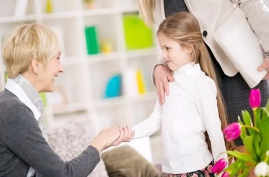Children good habits to develop standard table, parents must know!
11 min read
Early childhood is an important period for children to develop good behavior habits, so every parent wants to send their children to kindergarten.However, kindergarten education is not omnipotent. When teachers teach children to grow up, parents also need to clarify their responsibilities. Good habits are shaped by family education and kindergarten education.
Today, I listed some good habits that children need to develop in kindergarten. I hope that kindergarten teachers and parents can understand together, realize synchronous co-breeding of the home, and help children grow up excellent!
From the moment of entering the kindergarten, it is proved that the child has met the enrollment standards of the kindergarten and started to be independent. Therefore, the child only needs to learn these things in the kindergarten small class, which is already very excellent!
01 Living habit forming standard.
1. Develop a habit of going to bed early and getting up early so that you can sleep peacefully and independently.
Put your clothes in a fixed place before you go to sleep.
Small hands empty before falling asleep, do not play with bed items, keep quiet, do not make noise;
Sleep in a correct position. Lie on your right side or back. Do not cover your head or crawl.
2. When eating, don’t be picky, don’t be partial, don’t talk loudly, don’t look around, don’t play.
Cherish food, do not drop rice grains, no leftovers, keep the table clean;
Not picky, a rice a dish, can eat independently;
Eating quietly, not talking loudly, not looking about, not playing;
Learn to use cutlery properly, please raise your hand to add food.
3. Develop good toilet habits, know to go to the toilet in time, do not pee pants.
Children know to go to the toilet in time, do not pee pants, go to the toilet before raising their hands;
Queue to go to the toilet do not push, up and down the steps do not slide to the good handrail slowly walk;
Know the correct way to go to the toilet;
After using the toilet, arrange your clothes and pants with adult help.
4. Get into the habit of drinking plain water.
Can correctly recognize their own water cup, fixed position to take and put;
Know how to drink water according to demand, how much to drink, do not waste water, hot and cold to distinguish;
No water play, no roughhouse, hold the glass with both hands. When drinking water, do not talk or move around to avoid choking.
5. Know the order of dressing and undressing, and don’t wear backshoes.
Master the method of putting on and taking off clothes, able to put on and take off clothes with the help of adults;
Fold your clothes neatly;
Learn to wear shoes independently and distinguish between left and right.
6. Practice washing your hands before meals and after using the bathroom.
Know to wash hands before meals and after going to the bathroom, and can be completed under adult reminders;
Know and master the basic methods of washing hands, brushing teeth and washing face.
7. Develop good hygiene habits.
Don’t wipe your nose on your sleeve, don’t wipe your hands on your pants, keep your pants clean;
Not defecating in public;
Do not write or draw on public facilities;
Know not to put dirty things into the mouth, do not suck fingers, toys, etc., understand the truth of disease into the mouth.
02 Study habit forming standard.
1. Have a preliminary understanding of the use of pens, paper and other school supplies;
2. Learn to use art tools.
3. Understand the structure of books and cultivate children’s interest in reading;
Know the book cover, back cover, page number, title, etc.
Children like reading and are interested in books.
4. Learn to turn the book page by page, know how to cherish the book, take care of the book;
5. Sit upright, raise your hand to speak in class;
Learn how to sit: Keep your upper body straight and your legs straight while reading. When reading, pay attention to one foot away from the book, chest table a fist away;
When children speak, do not interrupt, do not fight, know to raise their hands to speak.
6. Listen carefully to the teacher and be able to express in complete language.
03 Learn etiquette habits to develop standards.
1.Kindergarten etiquette:
When entering the garden, you can not cry, walk by yourself, without adult hug, and go to the kindergarten happily.
Be able to say hello and “goodbye” to parents, teachers and children at the prompt of adults;
When leaving the kindergarten, do not walk with others or run out of the kindergarten gate;
Be able to carry your schoolbag, organize clothes, and put toys, books and other items in their place;
Cultivate children to care for public facilities. Understand the etiquette of taking and putting items, gently handle, and cultivate the good habit of returning things to their original place;
Know to take care of the kindergarten environment, not in the corridor running jump, roughhouse.
Do not mess on the indoor and external walls, do not destroy the class tables, chairs, books, toys and other items and public facilities.
2 Family etiquette:
Do not enter until you knock. Do not shout or bang on the door.
Know to duck when someone opens and closes the door. Close the door gently when entering or leaving;
Know to answer a ringing phone and answer it in time;
Able to have a simple conversation after answering the phone;
Know to say goodbye at the end of the conversation and put the receiver away;
Let children learn to receive guests politely. Can take the initiative to greet guests, do not disturb adults conversation;
When receiving guests, will use polite language, take the initiative to greet guests. Guests leave, can say goodbye to guests;
Guest, do not grab items, do not throw things.
3 Etiquette in public places:
Speak in a low voice in public places, do not make noise, do not cry, do not disturb others;
When talking with others, you can speak completely, express your meaning accurately, and do not talk while playing;
Being able to listen quietly to others, looking at them without looking around;
Don’t interrupt or grab someone else’s speech.
4 Common etiquette:
Be able to use polite phrases such as “good morning”, “hello” and “goodbye” under adult guidance;
Be able to address people politely, such as “teacher”, “grandpa”, “grandma”, “aunt”, “uncle”, etc.
Know to pass the item, eyes to look at each other, hands to pass.
Middle class Of course, there may be a lot of details, but these are the most basic content of life, because the child is still young, just contact kindergarten, so parents can not ask too much, after all, step by step is the best way.
But as the age of the child increases, the children’s habits will be more rich:
01Living habit forming standard.
1. Develop good rest and rest habits, master the correct sleeping position (right side sleep or back sleep).
Learn to fold clothes and keep them neatly in place;
Put the pillow right before going to bed, cover the quilt;
Master the correct sleeping posture (see Xiao Ban for correct posture);
Good habit of going to bed on time and getting up on time, tidy up your bedding after getting up.
2. Develop good toilet habits and know to go to the toilet in time.
Consciously queue to go to the toilet, do not play, do not stay, civilized go to the toilet;
Can flush toilet in time after defecation and urination;
Learn to use toilet paper to clean after the toilet, after the toilet tidy up the clothes and pants before coming out of the toilet;
3. Cultivate children to use cutlery correctly when eating, to eat independently, not picky, not partial, eat slowly, eat in time.
The ability to store food scraps together;
Pay attention not to spill food, keep the table top and the floor clean;
Keep quiet when eating, do not talk while eating, so as not to choke;
4. Learn simple arrangement and keep indoor and outdoor environment clean.
Able to arrange indoor items as required;
Can do simple cleaning work (sweeping the floor, wiping the tables and chairs, etc);
Know not to litter, not to spit.
5. Learn how to fasten buttons and put on clothes, shoes and hats neatly.
Learn to organize clothes;
Learn to put on and take off clothes, shoes and hats independently, fasten buttons, zip and tie shoelaces;
Do not throw toys and other items, learn to organize toys;
Play toys correctly, do not litter, do not damage damage toys;
After using objects and toys, tidy them up and put them back in their place.
6. Be open to prevention and treatment.
So that young children are willing to vaccinate and know not to cry when they are vaccinated;
Let children know when the body is uncomfortable, timely notify adults;
Let children know that they should cooperate with treatment in time when they are sick, and take medicine on time and according to the amount.
02 Educational standards for learning habits.
1. Learn how to use the pen and write posture;
2. Know how to care for stationery:
Handle lightly, do not damage stationery;
Don’t bite, don’t fall, don’t play with stationery as toys;
3. Preliminarily learned how to organize stationery;
Do not put stationery, things back to the original place;
Put the stationery back together after use.
4. Cultivate children’s good reading habits.
Don’t read in bright light or dim light;
Reading with correct posture and quiet, without disturbing others;
Do not use eyes for a long time, to ensure the reading time.
5. Listen to the teacher carefully, and fully understand the instructions and content of the words;
Be able to keep quiet and listen intently to the teacher;
Ability to respond to teacher’s instructions.
6. Encourage children to explore boldly, be diligent in hands, good at using their brains, and actively speak.
Be able to actively participate in activities organized by teachers and have interest in learning;
Don’t be afraid to raise your hand and express your opinion when studying.
7. Be able to express your thoughts and feelings boldly, completely, and clearly.
03 Learn etiquette habits to develop standards
1 Family etiquette:
Before going out, I will put on and tidy up my clothes, clean and tidy;
After returning home, I can take the initiative to say hello to my family members and briefly tell them what happened.
Reception guests or guest, friendly and small guests get along, know humility; When parting, know polite language.
Guest, do not rummage, mess with the owner’s home items, do not want the owner’s things;
2 Etiquette in public places:
Let children learn dining etiquette;
Have an independent, quiet meal. Use your cutlery properly and don’t knock it. Chewing food without making a sound;
After the meal, you can wait for those who have not finished the meal quietly. If you leave early, you should say goodbye to others and put the tableware neatly.
Learn garden etiquette (maintain public hygiene, do not litter, do not tread on the lawn, if encountered environmental behavior, can politely remind).
Take good care of public health, do not spit, do not throw the peel.
3 Common etiquette:
Will introduce themselves: “Hello (everyone)! My name is XXX, X years old this year, I am in XX kindergarten class X “;
Listen to others carefully, look at each other, do not interrupt;
Be able to give timely answers to questions raised by others;
Know that other people’s belongings should not be freely taken, should ask the other party’s consent before use;
Use proper borrowing language such as “Can I borrow XX please?” .
Big class When the child smoothly from the middle class, it proves that the child has independent consciousness, can take care of themselves, at this time the child also needs a higher level of pursuit, so when the child on the big class must pay attention to, need to start to let the child like learning:
01 Living habit forming standard.
1. Regular work and rest habits, able to consciously control their own behavior. And can independently go to bed and wake up after sorting.
To develop the habit of falling asleep and getting up regularly;
Be able to put on and take off clothes and organize clothes by yourself;
Consciously quiet sleep, nap during the toilet does not affect other children, wake up do not disturb other children;
Be able to make your own bed.
2. Able to take care of himself or herself and tidy up clothes after defecating.
3. Know how to eat nutritious food, don’t eat junk food, eat happy meals, don’t overeat.
4. Learn life skills like wearing and tying shoelaces and keeping your clothes clean.
5. Take the initiative to tidy up toys and keep the environment clean.
6. Make it a habit to wash your hands before meals and after using the bathroom.
7. Be able to wipe the table before eating, sweep the floor after eating, put away dishes and chopsticks and other cleaning work.
8. Keep yourself clean (take a shower, change clothes, etc).
9. Can take the initiative to clean indoor and outdoor environment.
10. Able to organize toys and schoolbags independently and keep toys clean.
11. Knowledge of simple disease prevention and treatment.
02 Educational standards for learning habits
1. Learn the correct posture of holding a pen, and master the use of various school supplies skillfully;
2. Master pre-study preparation and post-study arrangement:
3. Can actively read books;
4. You can stick to a book.
5. Children know that when speaking, the meaning is clear, the voice is loud and the word is clear.
6. Think, learn and ask.
7. Cultivate children’s initiative and innovation ability.
03 Learn etiquette habits to develop standards
1 Family etiquette:
Know the correct way and precautions to make a phone call. Can use “hello”, “May I speak to you”, “please wait” and other polite words to answer the phone;
Let children learn to receive guests politely. Know the proper etiquette when you are a guest in another person’s home (learn how to say goodbye, and know that thanking the host for his hospitality is helpful to the guest);
2 Etiquette in public places:
Make children know that queuing in order is a civilized etiquette behavior. If children meet others in a hurry, they can give up their place and let others go first.
Let the children know how to take the correct means of transportation (take the initiative to buy tickets, get on and off the bus in order, do not squeeze or push when getting on the bus, comity to the elderly, the infirm, the disabled and pregnant; No loud fighting while driving) ;
3 Common etiquette:
Young children can take the initiative to greet guests when they meet for the first time, and can introduce themselves and others. Natural expression, loud voice, moderate speed;
Take good care of what you borrow, avoid damaging it, and return it when you are done using it. The ability to lend freely to others;
Be able to use different kinds of polite expressions correctly;
The above are three stages of kindergarten in different degrees of habit formation. With the continuous strengthening of children’s cognitive ability, gradually let children contact with more new things, which is very helpful for children to develop good behavior habits.
At the same time as parents and teachers need to teach by example. The formation of good behavior habits of kindergarten children cannot be separated from the guidance of teachers and the edification of families.
It is hoped that parents can be familiar with the basic learning direction of kindergarten children, and the synchronization of the home can consolidate good behavior habits and realize the common goal of home co-breeding.






